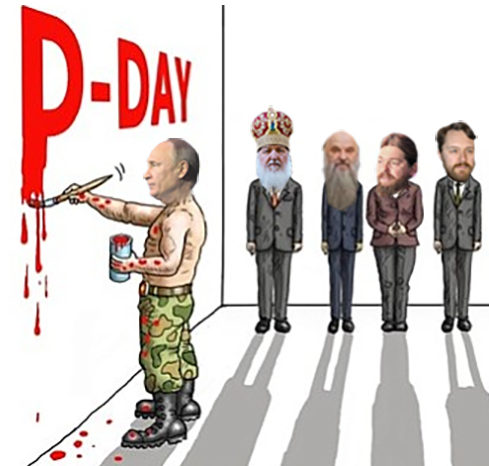
By John Helmer, Moscow
The head of the Russian Orthodox Church, Patriarch Kirill (lead image, 2nd from left) , has proclaimed his church the sovereign equal of the Russian state, and himself the political equal of the Russian president. The power transfer took place at a Kremlin ceremony last week in front of President Vladimir Putin (left).
“For the first time in Russia’s history,” Kirill’s declaration was reported by the state news agency Tass, “such a relationship has established itself between the Church and the state. Because even in the times of the Russian Empire, the church did not have an equal partner in the face of the government. It had always been subordinate to certain government institutions.”
Russian politicians and constitutional lawyers are slow, and also fearful, to publicly challenge the combination of Kirill and Putin. From a survey of these sources in Moscow, one responded: “Does the Pope claim to be the equal of the Italian President or Prime Minister? The Archbishop of Canterbury the equal of the British Queen? The Saudi King in a power-sharing deal with the Grand Mufti? Or Netanyahu the equal in Israel of the Chief Rabbi? The answer is obvious. Only in Russia would a churchman dare to make this claim, and violate the rights of all Russian citizens in the Constitution.”
“Nobody may usurp power in the Russian Federation”, proclaims Article 4 of the Russian Constitution. The Church may regard the patriarch as divinely appointed, but Vladimir Gundyayev, the civil name of Patriarch Kirill, qualifies constitutionally to be that nobody. So too are his senior associates on the Church’s ruling body, the Holy Synod – Metropolitans Varsonofy (Anatoly Sudakov, 2nd left), Chancellor of the Synod and Finance Minister; Tikhon (Georgiy Shevkunov, 3rd left) , National Security Advisor; and Hilarion (Grigoriy Alfeyev, right), Foreign Minister. According to the Constitution, “the seizure of power or usurpation of State authority shall be prosecuted under federal law.”
Constitutional experts also believe Kirill’s declaration violates the Russian Constitution’s Article 14: “The Russian Federation shall be a secular state. No religion may be established as the State religion or as obligatory.”
Kirill’s declaration was part of a speech last Thursday at a ceremony held in the Great Hall of the Kremlin Palace. The occasion, according to the website of the Moscow Patriarchate., was the 10th anniversary of the “enthronement” of Kirill as the Church’s leader. Tass headlined the story politically:
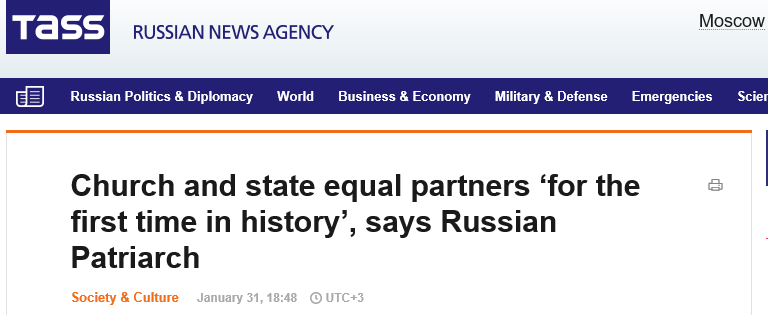
In the Church version of the speech, Kirill set out in detail his plan for the Church, having defeated the Roman Empire and its successors in Europe, as the new political force to defeat its contemporary enemies. Read the original here.
“How could the first Christians dare to come up with their more than modest forces against these colossi [ancient Greece, Rome], which to this day largely determine the specifics of European culture and civilization? We know that in the end Christianity turned out to be stronger and that it won, becoming a new leaven and transforming all these seemingly inviolable and self-sufficient foundations of social life, state structure, philosophical heritage, ancient culture. The Church, from the day of its Foundation, has all the necessary means to save the world, and Christians are called to inform the world, even if we are today pushed to silence and inaction.”
His target is secularism, Kirill fulminated. “Since the beginning of Christianity, the enemy of the human race has rebelled against the Church of Christ in various ways: from open persecution and persecution of Christians to attempts to declare Christianity obsolete and irrelevant. Today’s secular society is not averse to establish the place for an ‘ethnographic Museum’, where [Church] believers are no more than keepers of traditions that are not related to the real life of their contemporaries.”
Kirill also inveighed against atheism, science, and digital technologies. “The second challenge is the increasing attempts to interpret the data of scientific disciplines, especially such as psychology, sociology, neurophysiology and many others, in an ideological rather than scientific way. Scientific atheism of the Soviet time is a thing of the past, but the ideologists of modern ‘scienticism’ (i.e. belief in the omnipotence of science, absolutization of its role in culture) believe that all problems of man in the modern world can be solved by science. This approach significantly goes beyond the limits of the possible action of science in human life and artificially contrasts science and religion.”
“In the minds of contemporaries through movies and literature there is constantly invested the idea that a person requires ‘alteration’, ‘update’, or using the expression of the computer industry — ‘upgrade’. This is a new form of anti-Christianity, which declares sincere concern for the good of man, but in fact fundamentally destroys the true idea of humanity and man as the image of God.”
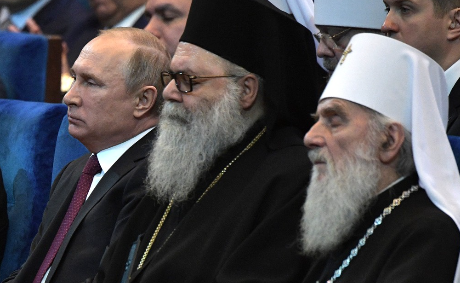
At the January 31 Kremlin ceremony, listening to the speech of Patriarch Kirill, from left to right: President Putin; the Patriarch of the Greek Orthodox Church of Antioch (Syria), Ioann X, and to his left, Irinej, Patriarch of Serbia
Kirill was responding to Putin’s opening speech.
“In December 2017, “ Putin began with a veiled attack on the Bolshevik Revolution, “we came together to celebrate the centenary of the restoration of the patriarchate in our country and recognised the decisive role played by the primates of the Russian Orthodox Church in many respects in the destiny of the Fatherland, the greatness of their devotion and service to our people.”
Putin was emphatic in his personal endorsement of Kirill’s 10-year rule, despite widespread reporting in the press of the corruption of the Church’s banks and financial affairs — click to read more — and of voter opposition to the transfer of state property to the Church. Putin took no note of public criticism of his own role which surfaced in an unguarded question from a shipyard worker in St. Petersburg during the president’s Direct Line television broadcast in June 2017.
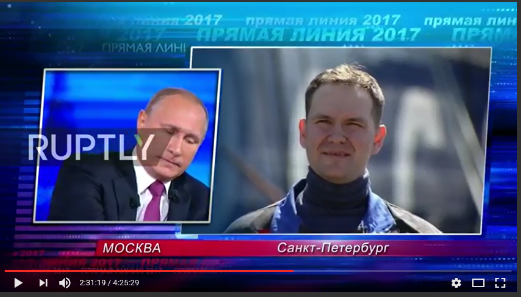
Source: http://en.kremlin.ru/ Asked to explain why the Kremlin had ordered St. Isaac’s Cathedral in St. Petersburg to be handed over to the Church, Putin replied: “I did not expect this question, especially from the Baltic Shipyard. What I can say is that Russia is a secular state. This is the way it was created, and it will stay this way. This is my first point.”
Last week Putin did not mention the secular state provision of the constitution. Instead, he backed the Church’s state roles and its exceptionalism. “I would like to offer special thanks to Patriarch Kirill and the Church for the spiritual guidance of the Russian army. Your sincere, heartfelt words help the soldiers and officers to defend their homeland with honour, instil in them confidence in their military prowess and moral righteousness… Today, as for many centuries before, the high purpose of the Russian Orthodox Church remains exceptionally important. I emphasise that the state will continue to actively promote constructive partnership with the Church in all significant areas, primarily, bringing up younger generations, preserving cultural heritage and solving pressing social problems…”
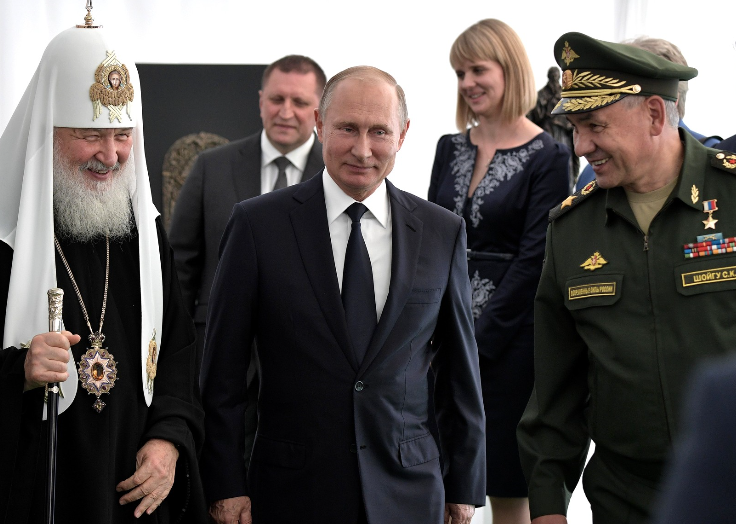
September 19, 2018: Patriarch, President, and Defence Minister Sergei Shoigu at the consecration ceremony for the foundation stone of the main church of the Armed Forces at Patriot Park, a new military theme park at Kubinka.
Putin also condemned political interference in church affairs; he was speaking of the autocephaly controversy in the Ukraine. For details, read this.
According to Putin, “unfortunately, we can see other examples as well where speculation, politicking and parasitism on matters of religious life have led to disunity among people and provoked anger and intolerance. Precisely such a project that is unrelated to faith and is false through and through, focusing on the struggle for power, is unfolding in Ukraine. Regrettably, the Patriarchate of Constantinople got dragged into it. In fact, we are witnessing flagrant interference in church life. Its initiators seem to have taken after the godless people of the previous century, who expelled believers from churches and attacked and persecuted the clergy. To reiterate, the state, the Russian authorities consider any interference in church affairs to be absolutely intolerable. We have and will always have respect for the independence of church life, all the more so in a neighbouring sovereign country. Nevertheless, we reserve the right to respond and do our best to protect human rights, including freedom of religion.”
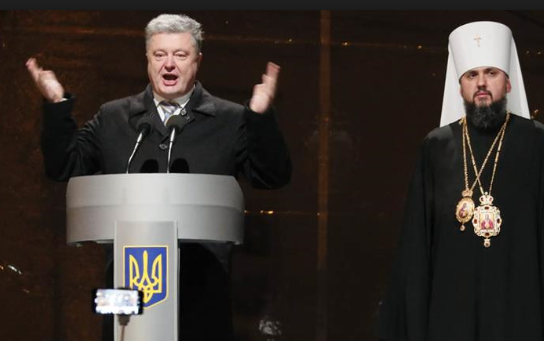
On December 15, Ukrainian President Petro Poroshenko (left) congratulated Metropolitan Epifaniy (Sergiy Dumenko) of the Kiev Patriarchate as the head of a new Ukrainian church, following a synod election. “This day will go down in history as a sacred day,” Poroshenko declared, “the day of the final independence from Russia. Glory! Glory! Glory!”
An informal poll of constitutional law experts in Moscow has identified ten articles in the Russian Constitution which the lawyers believe subordinate the Church to the state, subject its property to the civil law, and disallow exceptional privileges for church doctrines over the rights of individuals to disbelieve or ignore them.
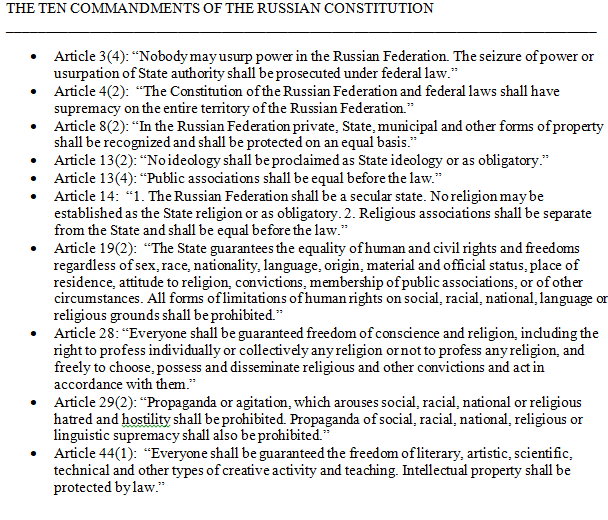
Source: https://www.constituteproject.org/
The lawyers were asked to comment on Kirill’s declaration of equality with the state and his attack on secularism and atheism. Not one Russian constitutional expert agreed to respond, either on or off the record. One, a professor of constitutional and administrative law at a provincial university, begged off the telephone on account of pressing business, but promised to respond quickly to emailed questions. He didn’t.
Members of the Federation Council’s Committee on Constitutional Legislation, and the State Duma Committee on Constitutional Legislation and State Building were asked the same questions – do Kirill’s declaration of equality of Church authority with state power and his attacks on secularism, science and atheism amount to violations of the Constitution? Ekaterina Polnyakova, deputy head of the staff of the Federation Council committee, and Senator Yelena Mizulina, deputy chairman of the committee, refused point-blank to answer. So did Vladimir Pligin, chairman of the Duma committee.
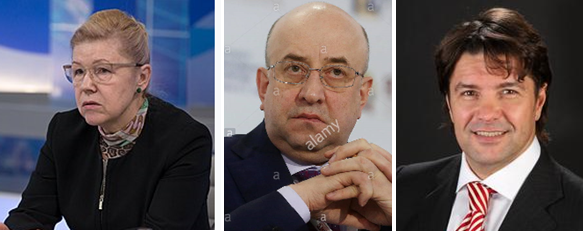
Left to right: Senator Yelena Mizulina, deputy chairman of the Federation Council’s committee on constitutional legislation; Deputy Vladimir Pligin, chairman of the State Duma committee on constitutional legislation; and Alexander Yushchenko, spokesman for the Communist Party of the Russian Federation in the State Duma. For more reporting on Mizulina’s record in parliament, read this.
Spokesmen for each of the parties in the State Duma were asked the same questions. United Russia, the ruling party, the Communist Party, the Liberal Democratic Party, and Just Russia all refused to answer.
The Patriarch in Moscow was asked to respond to the questions through his press service. A spokesman requested the questions by email, and then did not reply.











Leave a Reply